Posts by Christopher Lochhead
187 How To Become A Category Pirate | Christopher Lochhead on Lenny’s Podcast with Lenny Rachitsky
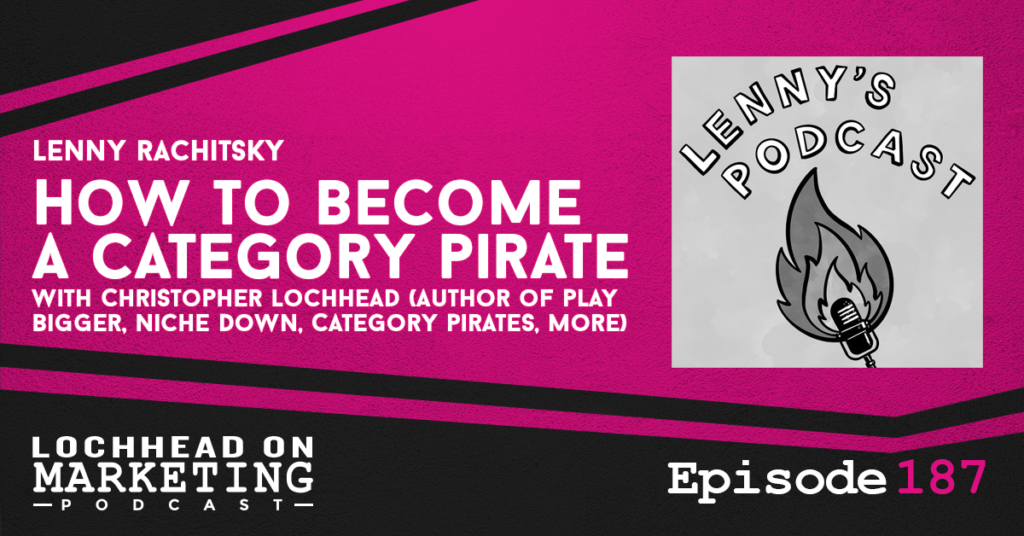
Podcast (lochheadonmarketing): Play in new window | Download (Duration: 1:48:49 — 74.7MB) | Embed
Subscribe: Apple Podcasts | Spotify | RSS | More
This week, we’re presenting to you Christopher Lochhead’s appearance on Lenny’s Podcast, hosted by Lenny Rachitsky.
Lenny Rachitsky runs the #1 Business Substack newsletter, Lenny’s Newsletter. It is legendary especially for people in tech marketing, product marketing, and startups. It’s so legendary that even Christopher pays for it. And now, he’s in it.
This is one of the more in-depth discussions Christopher has had with a very smart person about category design in a while. So settle in for a good listen and great lesson about category design.
Welcome to Lochhead on Marketing. The number one charting marketing podcast for marketers, category designers, and entrepreneurs with a different mind.
On taking the Good with the Bad
Lenny starts off the conversation by showing appreciation to Christopher’s extensive work, and jokingly adds that it was challenging to prepare for their conversation due to his numerous podcasts, books, and other content.
That said, Lenny noticed Christopher’s website displayed negative reviews prominently. When asked about it, Christopher explained his approach with humor, calling his team Category Pirates and embracing criticism. He believed it was essential for innovators not to fear criticism, citing examples of famous artists and musicians who faced initial negativity. Christopher displayed negative feedback to show the reality of creative work and to remind people not to take themselves too seriously.
Lenny admired Christopher’s ability to handle criticism and expressed the desire to adopt a similar mindset.
Lenny Rachitsky on how Lenny’s Newsletter came to be
Christopher Lochhead expressed admiration for Lenny’s branding choices, appreciating the simplicity of just being called “Lenny.” He found it endearing and highlighted that Lenny’s authenticity stood out in a world where many influencers create an aura of superiority.
Lenny shared that the name “Lenny’s Newsletter” was a default suggestion from Substack, and he never intended it to be a long-term commitment. Similarly, he struggled to find a different name for his podcast, wanting to avoid a self-centered approach.
But despite having his name in the branding, Christopher noted the content wasn’t self-centered; instead, it reflected Lenny’s genuine approach, unlike influencers who focus on creating envy. They both appreciated the authenticity in Lenny’s approach.
Lenny Rachitsky and Christopher Lochhead talk Category Creation
Lenny asked Christopher about category creation, a concept Christopher has championed over competition in existing markets.
Christopher explained how most people aim to compete by offering a better product or service in an existing category. However, legendary innovators don’t follow this path. They create entirely new categories, defining unique problems and solutions. Christopher emphasized that a single company in a category usually captures two-thirds of the market value, making category creation a lucrative strategy.
He cited Gojo Industries, creators of Purell, as an example. They didn’t just invent hand sanitizer; they redefined the problem of hand cleanliness, leading to a new market category. Christopher stressed the importance of focusing on problem-solving rather than just product features, making one’s brand irreplaceable in customers’ minds. He contrasted this approach with typical marketing, where companies invite comparison, emphasizing the power of radical differentiation and being a category creator.
To hear more about Christopher’s conversation with Lenny Rachitsky on Category Creation, download and listen to this episode.
If you want to learn more about Lenny Rachitsky, check out his Newsletter and Podcast at LennyRachitsky.com.
Don’t forget to grab a copy (or gift!) of one of our best-selling books:
Snow Leopard: How Legendary Writers Create A Category Of One
The Category Design Toolkit: Beyond Marketing: 15 Frameworks For Creating & Dominating Your Niche
A Marketer’s Guide To Category Design: How To Escape The “Better” Trap, Dam The Demand, And Launch A Lightning Strike Strategy
 The 22 Laws of Category Design: Name & Claim Your Niche, Share Your POV, And Move The World From Where It Is To Somewhere Different
The 22 Laws of Category Design: Name & Claim Your Niche, Share Your POV, And Move The World From Where It Is To Somewhere Different
We hope you enjoyed this episode of Lochhead on Marketing™! Christopher loves hearing from his listeners. Feel free to email him, connect on Facebook, Twitter, Instagram, and subscribe on iTunes!
334 How To Build An AI Startup, AI Video Content Marketing & More with Vikram Chalana, Founder/CEO of Pictory
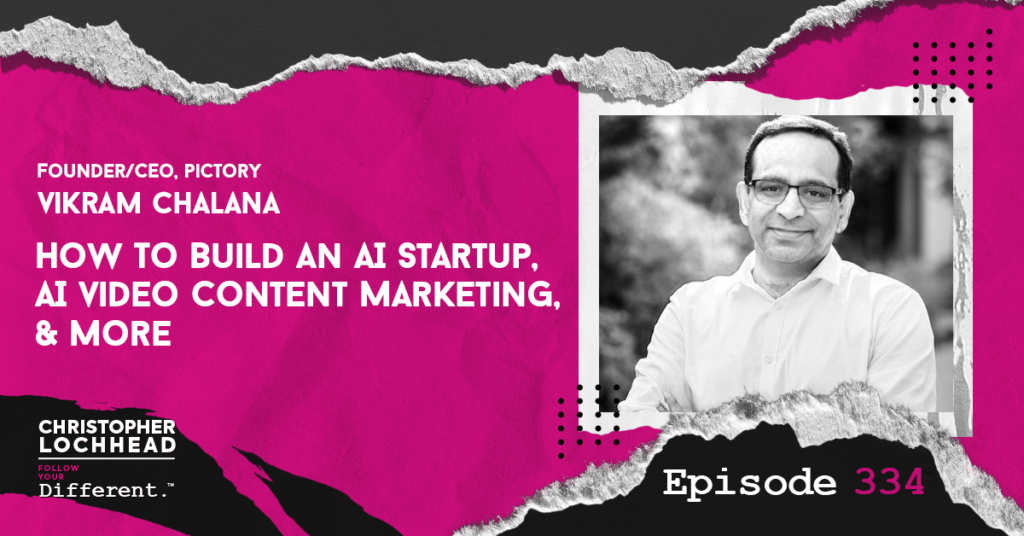
Podcast: Play in new window | Download (Duration: 1:08:29 — 47.0MB) | Embed
Subscribe: Apple Podcasts | Spotify | Pandora | RSS | More
How do you build an AI startup? What’s different about an AI startup compared to a normal tech startup? How do you get VCs to come to you instead of chasing them? If you have these questions in mind, our guest, Vikram Chalana, might have the answer you are looking for.
Vikram Chalana is the founder and CEO of Pictory.AI, an AI video creation tool that can help content marketers create content in a fast and scalable manner. So, if you have an interest in AI and what future it holds, you’re going to love this episode.
You’re listening to Christopher Lochhead: Follow Your Different. We are the real dialogue podcast for people with a different mind. So get your mind in a different place, and hey ho, let’s go.
Vikram Chalana on the Practicalities of Remote Work
Christopher and Vikram start off the conversation by talking about the benefits of working remotely. Both have stated that they have enjoyed their work-from-home setups, even after the hustle and bustle of the world has returned somewhat.
They also agree that, despite some backlash, remote work offers advantages, like eliminating commutes and enabling people to work in comfortable, happy environments. Vikram, a startup founder, values hiring talent globally, and that online tools like Slack and Zoom have made it easier to bridge the geographical barrier of work.
Though they acknowledge the desire for in-person interactions sometimes, they could not ignore the practicality of remote work.
Raising money for AI startup: when do you bring on investors?
Christopher and Vikram then discuss the timing of taking in investors and venture capital.
Christopher shares a conversation he had with a friend, a CEO in the AI space, who’s considering significant investment offers. They debate the need for additional funding despite having $5 million already. The friend’s reason for this is because of the demand for compute in AI due to expanding training data, which requires substantial investment. In this case, Vikram agrees that getting more funds makes sense because of the load they are taking as their data lake grows and the computing demand increases.
Vikram, on the other hand, expresses hesitance about raising funds when his SaaS startup is already capital efficient. He grappled with how to allocate the money, but also considers future investments in deep tech. Vikram also emphasizes his approach of launching products even if they are initially embarrassing, highlighting his focus on post-revenue stages for fundraising.
Vikram Chalana on startup valuations and fundraising strategies
Christopher and Vikram then talk about fundraising strategies, emphasizing the risks associated with overvaluation. Christopher shares some cautionary tales about companies that raised large sums at high valuations, only to face significant drops in worth, causing employee dissatisfaction.
Vikram, who favors a conservative approach, highlights his experience in building capital-efficient businesses. He stresses the importance of realistic valuations, suggesting that entrepreneurs should not overvalue their businesses.
They discuss an entrepreneur who achieved a healthy valuation without pushing it to the extreme. Christopher notes the contrasting situations faced by non-AI entrepreneurs struggling to attract VC attention, while AI startups like Vikram’s are sought after.
To hear more from Vikram Chalana and his thoughts on AI Startups, download and listen to this episode.
Bio
Vikram Chalana is an experienced business and technology executive with a demonstrated history in the enterprise software and medical device industry.
Before becoming the CEO of Steth IO, Vikram was the co-founder and CTO of Winshuttle – empowering people to transform their ERP-based business. He propelled the company’s technology strategy to support Enterprise, workflow and mobile solutions, helping thousands of customers maximize their investments in enterprise applications such as SAP ERP, Oracle EBS and Salesforce.com.
Prior to Winshuttle, Vikram spent several years in the software industry concentrating on data mining and business intelligence applications. His previous positions included engineering leadership positions at Verathon,Inc. and Insightful Software (now part of Tibco Corp). Vikram is a published author of more than 20 journal articles and holds more than a dozen US and international patents.
Links
We hope you enjoyed this episode of Christopher Lochhead: Follow Your Different™! Christopher loves hearing from his listeners. Feel free to email him, connect on Facebook, Twitter, Instagram, and subscribe on iTunes
186 Israel: War in “Startup Nation”
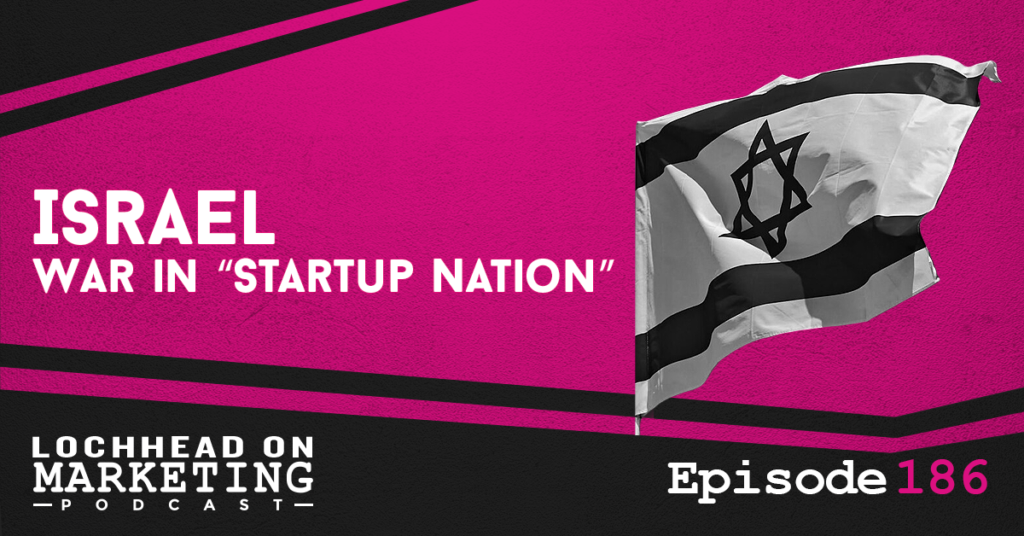
Podcast (lochheadonmarketing): Play in new window | Download (Duration: 11:23 — 7.8MB) | Embed
Subscribe: Apple Podcasts | Spotify | RSS | More
On this episode, let’s talk about Israel, and the war that has come to this “Startup Nation”.
Off the top, let me say the pain and suffering of what’s happening is unbelievable, unbearable. My heart goes out to Israel, all Israelis, and all Jews around the world.
I also want to say I have spoken with many Arabs since this happened. There’s a very big difference between an Arab or a Palestinian and Hamas. They are not the same thing. My Arab friends wanted to stress that to me. My heart goes out to all the innocent Arabs in Gaza and in the region who are suffering and also experiencing extraordinary pain and loss.
Israel is a “Startup Nation”
If you’ve been in tech for a while, you’ve probably worked with Israelis. For the better part of my professional life, I’ve worked with entrepreneurs, engineers and executives from the country.
The Israeli’s I know are smart, tough, driven, no-nonsense result producers. If you want to get big tech shit done, work with Israelis.
It has one of the highest concentrations of startups in the world. Its tech sector is a major contributor to the country’s economy. Tech is 18% of Israel’s GDP, and 14% of all salaried employees work in Tech. That’s roughly 500,000 people. On top of which, 50% of Israel’s total exports come from Technology developed by these people.
The framework Israelis created to co-locate Israel/US tech startups, established an innovation model that is envied the world over.
Israel has over 6,000 Tech Companies
The impact of this war borne out by the Israeli people.
Reports indicate that the start if this war was “the darkest day in Jewish history since the end of the Holocaust.”
And, it will also be felt by virtually every major tech company in the world.
There are over 6,000 tech companies operating in Israel, including some of the largest names, with Apple, Microsoft, Google, and Intel to name a few. These companies have a variety of strategic operations in Israel, including research and development centers, sales offices, and customer support centers.
Israel is home to over 15,000 startups, and they employ over 100,000 people. In 2021, Israeli tech companies raised a record $25.6 billion in venture capital funding.
Today, they are scrambling to secure and support their people.
15,000 Israeli Tech Startups
Now, this evil war is extracting an unbearable human cost. More death, suffering and disruption is sure to follow. And this war will be felt by many of us in the tech industry.
My heart aches for Israel.
My heart aches for all of the innocent souls in the Middle East.
We’re praying for peace, and the day we can all get back to building legendary companies.
To hear more of Christopher Lochhead’s thoughts on the recent events that unfolded in Israel, download and listen to this episode.
If you wish to join the conversation and get more information on the matter, check out Christopher’s post on LinkedIn:
We hope you enjoyed this episode of Lochhead on Marketing™! Christopher loves hearing from his listeners. Feel free to email him, connect on Facebook, Twitter, Instagram, and subscribe on iTunes!
333 Israel: War in “Startup Nation”
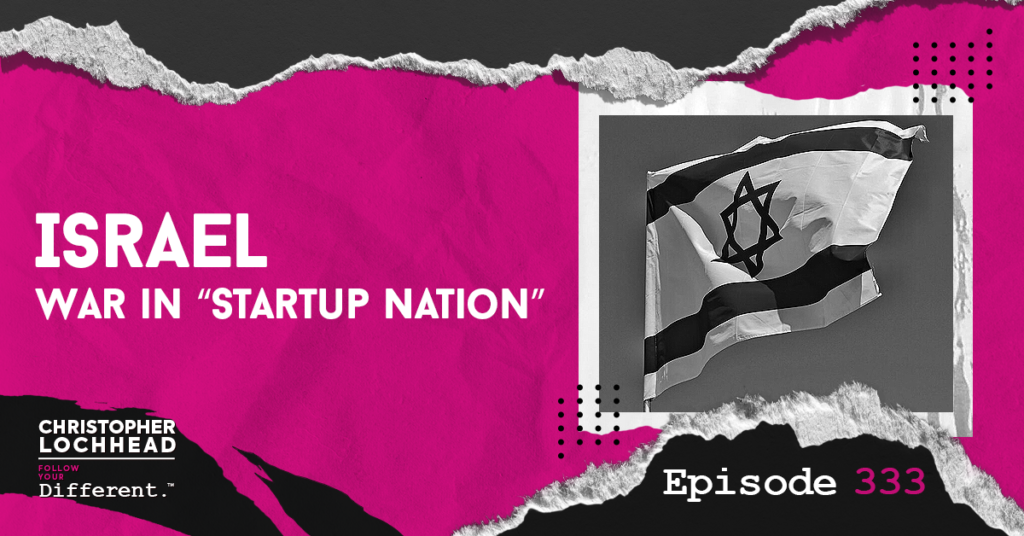
Podcast: Play in new window | Download (Duration: 11:23 — 7.8MB) | Embed
Subscribe: Apple Podcasts | Spotify | Pandora | RSS | More
On this episode, let’s talk about Israel, and the war that has come to this “Startup Nation”.
Off the top, let me say the pain and suffering of what’s happening is unbelievable, unbearable. My heart goes out to Israel, all Israelis, and all Jews around the world.
I also want to say I have spoken with many Arabs since this happened. There’s a very big difference between an Arab or a Palestinian and Hamas. They are not the same thing. My Arab friends wanted to stress that to me. My heart goes out to all the innocent Arabs in Gaza and in the region who are suffering and also experiencing extraordinary pain and loss.
Israel is a “Startup Nation”
If you’ve been in tech for a while, you’ve probably worked with Israelis. For the better part of my professional life, I’ve worked with entrepreneurs, engineers and executives from the country.
The Israeli’s I know are smart, tough, driven, no-nonsense result producers. If you want to get big tech shit done, work with Israelis.
It has one of the highest concentrations of startups in the world. Its tech sector is a major contributor to the country’s economy. Tech is 18% of Israel’s GDP, and 14% of all salaried employees work in Tech. That’s roughly 500,000 people. On top of which, 50% of Israel’s total exports come from Technology developed by these people.
The framework Israelis created to co-locate Israel/US tech startups, established an innovation model that is envied the world over.
Israel has over 6,000 Tech Companies
The impact of this war borne out by the Israeli people.
Reports indicate that the start if this war was “the darkest day in Jewish history since the end of the Holocaust.”
And, it will also be felt by virtually every major tech company in the world.
There are over 6,000 tech companies operating in Israel, including some of the largest names, with Apple, Microsoft, Google, and Intel to name a few. These companies have a variety of strategic operations in Israel, including research and development centers, sales offices, and customer support centers.
Israel is home to over 15,000 startups, and they employ over 100,000 people. In 2021, Israeli tech companies raised a record $25.6 billion in venture capital funding.
Today, they are scrambling to secure and support their people.
15,000 Israeli Tech Startups
Now, this evil war is extracting an unbearable human cost. More death, suffering and disruption is sure to follow. And this war will be felt by many of us in the tech industry.
My heart aches for Israel.
My heart aches for all of the innocent souls in the Middle East.
We’re praying for peace, and the day we can all get back to building legendary companies.
To hear more of Christopher Lochhead’s thoughts on the recent events that unfolded in Israel, download and listen to this episode.
If you wish to join the conversation and get more information on the matter, check out Christopher’s post on LinkedIn:
We hope you enjoyed this episode of Christopher Lochhead: Follow Your Different™! Christopher loves hearing from his listeners. Feel free to email him, connect on Facebook, Twitter, Instagram, and subscribe on iTunes
332 The Future of Tech Startups with Paul Martino of Bullpen Capital
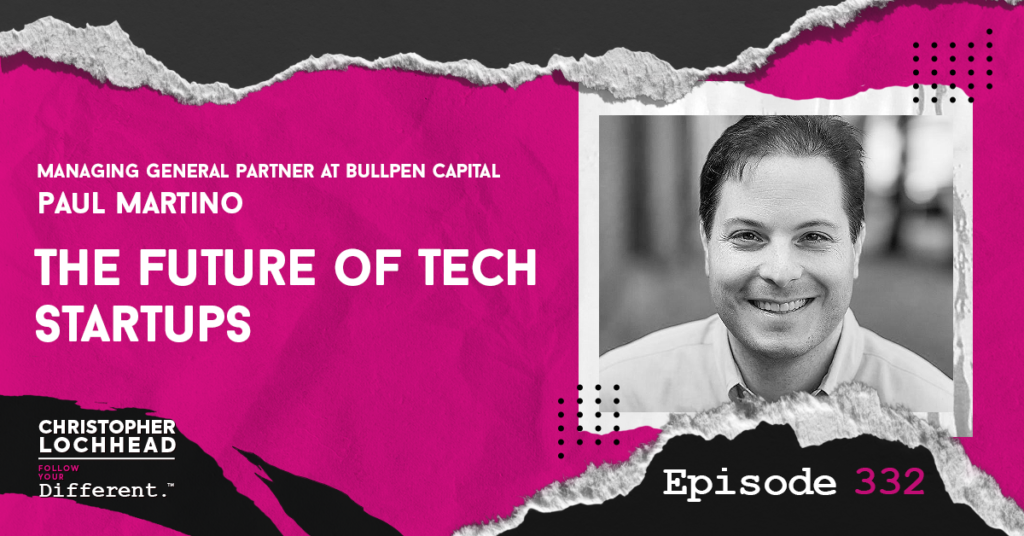
Podcast: Play in new window | Download (Duration: 1:29:33 — 61.5MB) | Embed
Subscribe: Apple Podcasts | Spotify | Pandora | RSS | More
If you have been following Silicon Valley and tech news, you might be wondering what the future of tech startups in general are and what trends venture capitalists are following nowadays. Our guest, Paul Martino, might be able to answer those questions for you.
Paul Martino is the founder of eight companies including Tribe; one of the world’s first social networks, and aggregate knowledge a big data advertising company. Paul holds over a dozen patents on core social networking concepts, content targeting and recommendation systems.
This is a fun, fascinating and deeply insightful conversation with one of our favorite thinkers in the tech startup world.
You’re listening to Christopher Lochhead: Follow Your Different. We are the real dialogue podcast for people with a different mind. So get your mind in a different place, and hey ho, let’s go.
Paul Martino on Venture Capital, Fundraising, and Market Sentiment
The conversation begins with Paul Martino and Christopher Lochhead talking about the challenging environment for venture capitalists.
Paul Martino acknowledges the tough 18 months, highlighting a temporary upswing but anticipating further challenges.
Christopher shares mixed signals from CEOs, noting a tough market despite some positive indicators. Paul observes a significant change in fundraising capital availability in Q2, attributing it to increased confidence with NASDAQ’s rise.
As Christopher mentions entrepreneurs preferring angel investors over traditional VCs due to difficulties and lowered valuations, Paul disapproves of VC complacency during tough times and assures entrepreneurs that committed VCs like him are open for business, emphasizing their entrepreneurial mindset. He also understands the logic behind entrepreneurs relying on existing investors during market uncertainty.
Paul Martino on the impact of market downturn on early- and late-stage companies
They then continue to discuss the challenges faced by late-stage companies dealing with overvalued situations.
Paul emphasizes the distinction between a down round and a recap, suggesting that a down round, while not ideal, is manageable. He also stresses the importance of CEOs accepting a realistic valuation to issue new options and retain employees, criticizing those who let ego hinder practical decisions.
Christopher raises concerns about companies with significantly reduced growth rates, questioning their true value. Paul gives a hypothetical example of a $10 billion company dropping to $3 billion, highlighting the need for companies to adapt and not shy away from necessary adjustments to move forward.
Paul Martino on San Francisco’s decline and potential for recovery
The conversation shifts to the topic of the decline of vibrant cities like San Francisco and Portland.
Paul observes the eerie emptiness in once-bustling areas, expressing concern for the loss of the lively environment. Lochhead shares similar sentiments, reminiscing about the exciting times they experienced during previous boom periods. They discuss the root causes of these issues, focusing on policy changes like Prop 47 and Prop 57 in California that decriminalized theft under $1,000, leading to increased crime rates.
Paul believes it will take a new generation of pragmatic leaders to address institutional problems and revive cities, estimating a 20-year timeframe for San Francisco’s recovery. The conversation highlights their shared disappointment in witnessing the decline of the cities they once knew.
To hear more from Paul Martino and the future of tech startups, download and listen to this episode.
Bio
Paul Martino is a Managing General Partner at Bullpen Capital. Paul is the founder of eight companies including Ahpah Software (a computer security firm acquired by InterTrust; Tribe (one of the world’s first social networks), and Aggregate Knowledge (a big data advertising attribution company acquired in 2014 by Neustar).
Paul’s early online gaming innovations in multi-player user experience from over 30years ago are the inspiration for several of the modern social gaming offerings.
He holds over a dozen patents on core social networking concepts, content targeting, and recommendation systems.
Prior to forming Bullpen In 2010, he was an active angel investor and personally invested in the first rounds of Zynga (NASDAQ: ZNGA), TubeMogul (NASDAQ: TUBE), and uDemy.
He sold a company into Millennial Media prior to its public offering (Condaptive), as well as to Marketo prior to Its public offering (Crowd Factory).
While at Bullpen, Paul has led several of its key investments including FanDuel (merged with Flutter Entertainment (LSE:FLTR)), Swish Analytics, Jackpocket, Grove, Ipsy, SpotHero, Ocrolus, and Life360 (ASX:360). Paul served on the board of directors of FanDuel for over 5 years during a period of tremendous high growth.
Since forming Bullpen, Paul has stayed active as an entrepreneur forming companies specifically at the Intersection of sports, gaming, gambling, and technology.
His most recent endeavor, Bankroll, is building a next generation sports betting focused elevated dining restaurant in his hometown of Philadelphia.
Paul also created a film production company, 818 Media, that produced the film Inside Game. Inside Game tells the story of the 2007 NBA betting scandal in which referee Tim Donaghy’s leveraged unreported inside information to wager on games including those that he officiated.
Link
Connect with Paul Martino!
We hope you enjoyed this episode of Christopher Lochhead: Follow Your Different™! Christopher loves hearing from his listeners. Feel free to email him, connect on Facebook, Twitter, Instagram, and subscribe on iTunes
331 How To Have A Legendary Career, Regulate AI & Much More with David Schellhase, Silicon Valley Legal Obi Wan and Salesforce & Slack’s Former General Counsel
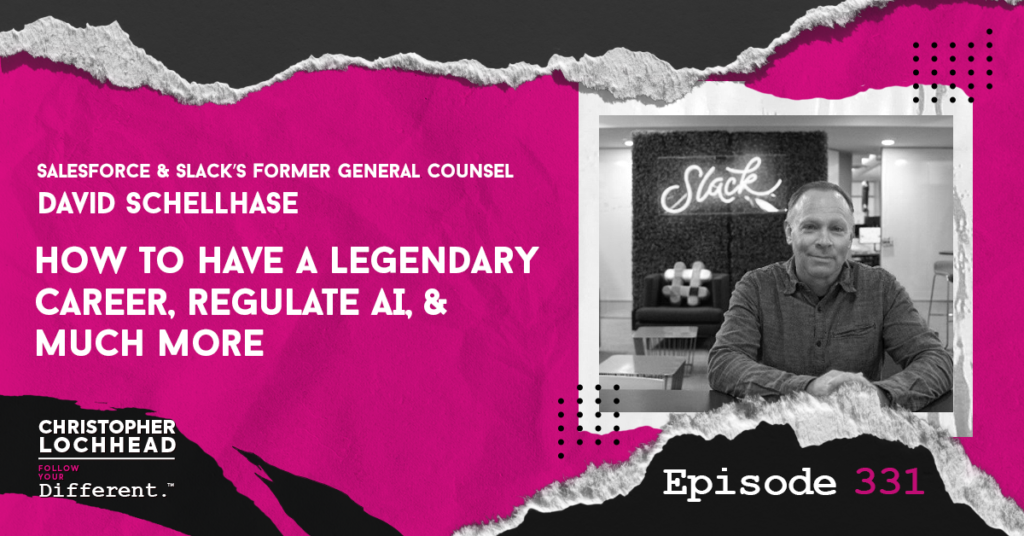
Podcast: Play in new window | Download (Duration: 1:34:15 — 64.7MB) | Embed
Subscribe: Apple Podcasts | Spotify | Pandora | RSS | More
If you’re someone who wants to have a legendary, long-term, and super-successful professional career, you’re going to love this dialogue with Silicon Valley’s Legal Obi-Wan, David Schellhase.
David Schellhase is considered as one of the greatest General Counsels in Silicon Valley history. David was the GC at Salesforce for nine years, and he was the GC that took them public. He was the GC at Groupon, and most recently, the GC at Slack.
On this highly engaging episode, David and Christopher cover everything from the problems plaguing San Francisco in California, to how lawyers can be true partners who helped power the success of a legendary business.
You’re listening to Christopher Lochhead: Follow Your Different. We are the real dialogue podcast for people with a different mind. So get your mind in a different place, and hey ho, let’s go.
David Schellhase on the Challenges facing San Francisco
The dialogue starts off on the topic of the current state of San Francisco. David described downtown San Francisco as a ghost town with a lack of energy and a significantly reduced population, feeling like just a really small scale of what it was four years ago. He expressed concern that there’s no immediate rebound in sight.
Christopher pointed out that policies and politicians may have contributed to the city’s issues, but some complexity exists in understanding the causes. David acknowledged that many are well-intentioned but lack a clear understanding of cause and effect.
They discussed the challenges of addressing issues like addiction and the need for comprehensive solutions, rejecting simplistic approaches. David emphasized the difficulty of the situation and the desire for an easy solution.
Stuck in the middle
David Schellhase discussed the challenges of dealing with complex problems, particularly in San Francisco, where there’s a high tolerance for individuals facing issues like addiction and homelessness. He noted the difficulty of reaching marginalized individuals with chemical problems.
Christopher shared a scuba diving analogy, emphasizing the need to make a clear choice between being supportive and caring or taking a more serious approach. He highlighted the inconsistency in dealing with crimes related to opioids, such as fentanyl, where some individuals receive lenient sentences despite carrying dangerous substances. Christopher argued that society is stuck in an ambiguous middle ground, where it either needs to fully legalize and regulate these substances or enforce stricter criminal penalties, as the current approach is leading to harmful consequences.
David Schellhase on addressing the societal issues in San Francisco
David and Christopher then continued to discuss the lack of a coherent strategy to address societal problems in San Francisco and the broader United States. They acknowledged the need for a balanced approach that avoids mass incarceration but also holds individuals accountable for their actions.
David emphasized the complexity of San Francisco’s permissive culture and the challenges it faces in dealing with issues like addiction and homelessness. Christopher highlighted the importance of a holistic approach, including both support programs and consequences for criminal behavior. He argued that the U.S. lacks effective measures to deter crime, with many serious offenses going unsolved and unpunished.
To hear more from David Schellhase and his thoughts about the current Justice system, rise of AI, and how to build a long-term successful career, download and listen to this episode.
Bio
David Schellhase is of Counsel to Sullivan & Cromwell.
He is resident in the Firm’s Palo Alto office and focuses on a range of technology-related and business issues.
David has more than 25 years of experience in the technology industry and most recently served as the General Counsel of Slack Technologies, Inc.
While at Slack, David oversaw the company’s 2019 direct stock listing IPO.
Prior to that, he served as Chief Operating Officer at Honest Work Corporation, a software company that was acquired by Twitter, Inc.
He also previously served as General Counsel and then Strategic Advisor at Groupon, Inc. and for more than eight years as General Counsel of Salesforce, Inc. where he guided both companies through successful IPOs.
Professional Activities and Community Involvement
- Trustee, Junior State of America Foundation
- Board Member, Next Chapter Publications
- Cited in a Law360 article, “4 Major Concerns on GCs’ Minds for 2023” (January 3, 2023)
Credentials
Education
- Cornell Law School, J.D., 1990
- Columbia University, B.A., 1985
Links
Connect with David Schellhase!
LinkedIn | Sullivan & Cromwell
We hope you enjoyed this episode of Christopher Lochhead: Follow Your Different™! Christopher loves hearing from his listeners. Feel free to email him, connect on Facebook, Twitter, Instagram, and subscribe on iTunes
185 Where Is Consumer Spending Heading? | Pirates Perspective
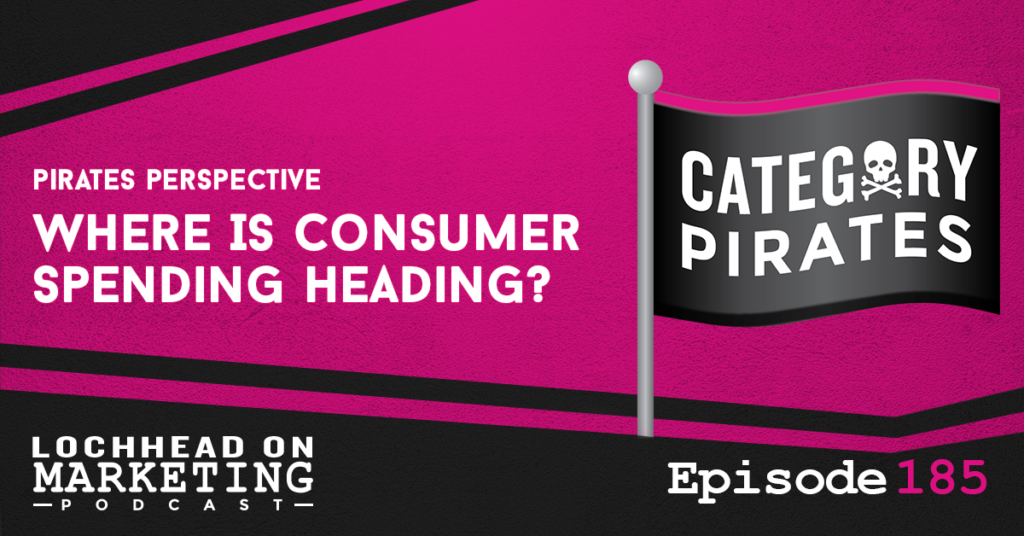
Podcast (lochheadonmarketing): Play in new window | Download (Duration: 18:22 — 12.6MB) | Embed
Subscribe: Apple Podcasts | Spotify | RSS | More
On this episode of Lochhead on Marketing, we are presenting some Pirates Perspective from our newsletter, Category Pirates about consumer spending trends.
Eddie Yoon, Christopher Lochhead and Katrina Kirsch of Category Pirates discuss the latest consumer spending reports and what they mean for the retail category and retail category queens. They also dive into a category opportunity for McDonalds and how it could impact the future of food delivery.
Welcome to Lochhead on Marketing. The number one charting marketing podcast for marketers, category designers, and entrepreneurs with a different mind.
The Changing Retail Landscape
Eddie Yoon examines the evolving economic landscape and its impact on U.S. consumers. Employing a Category Science lens, Eddie highlights significant disparities in economic indicators. Disposable personal income in July saw a mere 0.15% uptick, the year’s lowest, while personal consumption expenditures (PCE) surged by 0.82%, marking a 2023 high. This income-spending disconnect raises concerns.
Eddie notes the imminent return of student loan payments, averaging $503 per month, which may strain disposable income. Loan delinquencies, nearing 2020 levels, signal financial challenges. Notably, a fourfold increase in young adults aged 25 to 34 living with parents since the 1960s reflects economic constraints driving lifestyle changes.
Prompted by Christopher, Eddie also identifies two contrasting trends: robust growth in experiences and personal transformations versus declining interest in traditional goods. While international travel and categories like medical aesthetics flourish, traditional retailers like Target, Kroger, and Home Depot report declining revenues. Eddie predicts a future marked by consolidation and M&A, with only a select few brands and private labels surviving.
Navigating the Shifting Consumer-Driven Economy
Christopher Lochhead and Eddie Yoon then tackle the intriguing dual signals in the economy, driven by increasing digital influence on consumer behavior. On one hand, positive indicators suggest the American consumer remains a key economic driver, with retail sales growing by 0.6% in August and a forecasted real GDP growth of 3.5% for the third quarter.
However, Eddie Yoon emphasizes the underlying shifts: Consumers are driving economic growth through increased credit spending, but it raises questions about sustainability. Many are making significant changes in their financial habits, including declining college enrollments, reduced home purchases, and a lower birth rate, all contributing to a redefined economic landscape.
The trend toward single-person households, now at 29%, signifies a fundamental shift in the traditional nuclear household model. While the macroeconomic picture may still appear positive, these changes point to a significant remaking of the American economy, shaped by evolving consumer preferences influenced by digital transformations.
McDonald’s Dilemma
Christopher and Eddie then discuss McDonald’s recent announcement to phase out fountain drinks inside their stores by 2032, which highlights a significant shift in consumer behavior. Currently, 40% of their revenue is generated through app purchases, delivery, and drive-thru, indicating a decline in physical store visits. This trend reflects the changing preferences of Native Digitals, who prefer digital-first experiences and the conveniences they bring.
As consumers become more discerning and value experiences over material possessions, businesses need to adapt to these mega trends. Eddie Yoon points out that while some trends are favorable, like digital and app-focused sales, the shift in product mix poses challenges. McDonald’s heavily relies on the profitability of fountain drinks, which drive a substantial portion of their margins. However, the convenience of home beverages and changing consumer preferences may lead to a decline in the sale of large-size drinks at McDonald’s, impacting their profitability in this area.
To learn more about the Pirates’ solution to McDonald’s dilemma and more on consumer spending trends, download and listen to the episode. If you want to join in the discussion, subscribe to Category Pirates and find more Pirates Perspective buried around the beach.
Don’t forget to grab a copy (or gift!) of one of our best-selling books:
Snow Leopard: How Legendary Writers Create A Category Of One
The Category Design Toolkit: Beyond Marketing: 15 Frameworks For Creating & Dominating Your Niche
A Marketer’s Guide To Category Design: How To Escape The “Better” Trap, Dam The Demand, And Launch A Lightning Strike Strategy
 The 22 Laws of Category Design: Name & Claim Your Niche, Share Your POV, And Move The World From Where It Is To Somewhere Different
The 22 Laws of Category Design: Name & Claim Your Niche, Share Your POV, And Move The World From Where It Is To Somewhere Different
We hope you enjoyed this episode of Lochhead on Marketing™! Christopher loves hearing from his listeners. Feel free to email him, connect on Facebook, Twitter, Instagram, and subscribe on iTunes!
330 The World’s Leading Alien Hunter: Harvard’s Top Astronomer Dr. Avi Loeb, Author of Interstellar
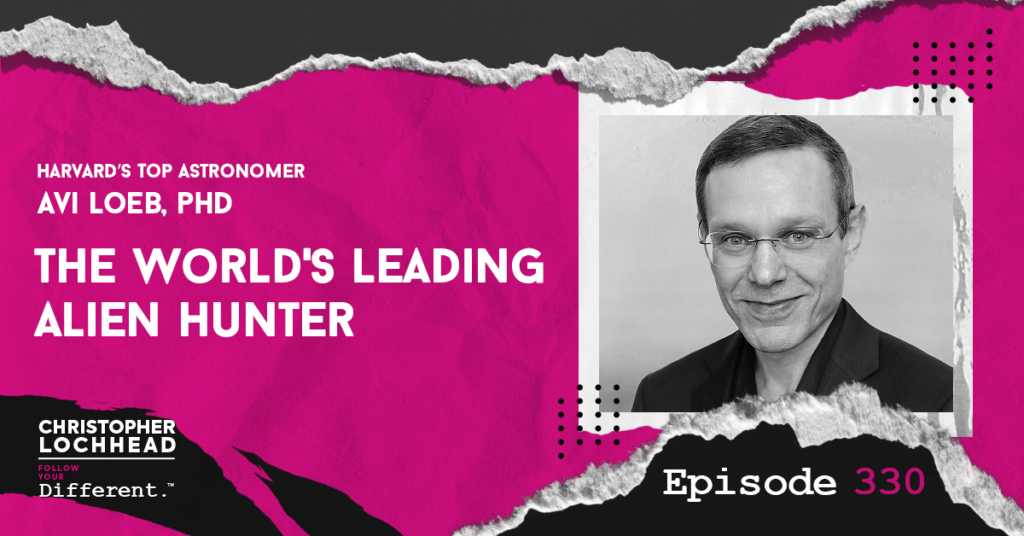
Podcast: Play in new window | Download (Duration: 1:28:31 — 60.8MB) | Embed
Subscribe: Apple Podcasts | Spotify | Pandora | RSS | More
On this episode of Christopher Lochhead: Follow Your Different, Dr. Avi Loeb makes a return to discuss why traditional science and academic circles still consider researching aliens as taboo. If you are not familiar with Dr. Avi Loeb and his work, you can check out our previous conversations with him (FYD 202 & FYD 230).
Dr. Avi Loeb is the most credential scientist and astronomer ever to say that we have been visited by something outside of our galaxy that is alien in nature. He also has a new book out called Interstellar: The Search for Extraterrestrial Life and Our Future in the Stars.
And now, Professor Loeb with his team are the first ever to discover and retrieve interstellar objects that landed on Earth. And even further, Professor Loeb says that he thinks there’s a case to be made that these remnants of these objects that came from outside of our solar system and landed in our ocean could be alien. So if you are interested in that and things from outside our earth, stay tuned to this episode.
You’re listening to Christopher Lochhead: Follow Your Different. We are the real dialogue podcast for people with a different mind. So get your mind in a different place, and hey ho, let’s go.
Dr. Avi Loeb and his Interstellar discovery
The conversation begins with Christopher expressing his admiration for Professor Loeb’s work and delves into the controversial nature of his recent actions. Professor Avi Loeb then talks about his expedition to Papua New Guinea and its connection to a significant interstellar discovery.
Professor Loeb explains that his journey to Papua New Guinea was prompted by the detection of a fast-moving object that collided with Earth in 2014. This object exhibited unusual properties, including its high speed and material strength. It was determined to have come from outside the solar system, which sparked initial skepticism among his colleagues but was later confirmed by the US Space Command.
To investigate further, Professor Loeb led an expedition to the Pacific Ocean, where the object had crashed. The team used a specialized sled with magnets to collect millimeter-sized particles from the ocean floor, which had rained down during the object’s explosion. After extensive searching, they found molten droplets and other materials that provided crucial insights into the object’s composition and origin.
Dr. Avi Loeb and the Spaceballs
Professor Avi Loeb then talks about the remarkable discovery of spaceballs, which are unusual spherical objects with unique compositions.
Professor Loeb also adds that the expedition was a significant effort funded by private donors, emphasizing the extensive work put into the project. He then talks about receiving the spaceball materials at his doorstep via FedEx, and he wasn’t concerned about a slight delay given the billions of years it took for the materials to arrive on Earth.
They then talk in detail about the analysis of these spaceballs, with Professor Loeb’s intern, Sophie Bertram, helping to discover and analyze a significant number of them. They found three high-yield regions along the meteor’s path, suggesting these regions might correspond to the flares observed during the meteor’s entry. The composition of these spaceballs, dubbed “Bilbao,” was unique, containing elements not found in known Earth, Moon, Mars, or asteroid materials. This composition further supports the idea that these materials originated from outside the solar system.
Dr. Avi Loeb on the skepticism of Traditional Science
Professor Loeb explains that initially, there was skepticism from some colleagues and reviewers when the data about these interstellar landings that occurred in 2014, leading to a delay in publishing the findings.
However, three years later, the US Space Command formally confirmed the object’s interstellar nature with a high level of confidence. This confirmation prompted Professor Loeb to plan an expedition to Papua New Guinea, gather a team, design specialized equipment, and secure funding.
During the expedition, they discovered unique materials known as “spaceballs” that didn’t resemble anything from the solar system. This discovery further supported the US Space Command’s assertion about the object’s interstellar origin.
Professor Loeb expresses frustration with astronomers who clung to traditional models and refused to revise them in light of new data, referring to it as the “Stone Age of Science.” He highlights the importance of adjusting models when they don’t align with observed data.
To hear more from Dr. Avi Loeb and his interstellar discoveries, download and listen to this episode.
Bio
“The world’s leading alien hunter”—New York Times Magazine
Dr. Abraham (Avi) Loeb is the Frank B. Baird, Jr., Professor of Science at Harvard University.
He received a Ph.D. in Physics from the Hebrew University of Jerusalem in Israel at age 24 (1980-1986), led the first international project supported by the Strategic Defense Initiative (1983-1988), and was subsequently a long-term member of the Institute for Advanced Study at Princeton (1988-1993).
Loeb has written 8 books. These includes most recently, Extraterrestrial (Houghton Mifflin Harcourt, 2021), and about 800 papers (with an h-index of 113) on a wide range of topics. Topics include black holes, the first stars, the search for extraterrestrial life and the future of the Universe.
He had been the longest-serving Chair of Harvard’s Department of Astronomy (2011-2020), Founding Director of Harvard’s Black Hole Initiative (2016-present), and Director of the Institute for Theory and Computation (2007-present) within the Harvard-Smithsonian Center for Astrophysics.
He is the Chair of the Board on Physics and Astronomy of the National Academies (2018-present). Additionally, he is also an elected fellow of the American Academy of Arts & Sciences, the American Physical Society, and the International Academy of Astronautics.
Loeb is a member of the President’s Council of Advisors on Science and Technology (PCAST) at the White House and a member of the Advisory Board for “Einstein: Visualize the Impossible” of the Hebrew University.
He also chairs the Advisory Committee for the Breakthrough Starshot Initiative (2016-present). Further, he serves as the Science Theory Director for all Initiatives of the Breakthrough Prize Foundation.
In 2012, TIME magazine selected Loeb as one of the 25 most influential people in space. In 2020 Loeb was selected among the 14 most inspiring Israelis of the last decade.
Click here for Loeb’s commentaries on innovation and diversity.
Links
Learn more about Dr. Avi Loeb!
Harvard | Harvard.edu | Wikipedia | Science Today
Amazon Books – Extraterrestrial: The First Sign of Intelligent Life Beyond Earth
Amazon Books – Interstellar: The Search for Extraterrestrial Life and Our Future in the Stars
Harper Collins – Interstellar: The Search for Extraterrestrial Life and Our Future in the Stars
We hope you enjoyed this episode of Christopher Lochhead: Follow Your Different™! Christopher loves hearing from his listeners. Feel free to email him, connect on Facebook, Twitter, Instagram, and subscribe on iTunes
184 Building Your Digital Reputation with Josh Greene, CEO of The Mather Group
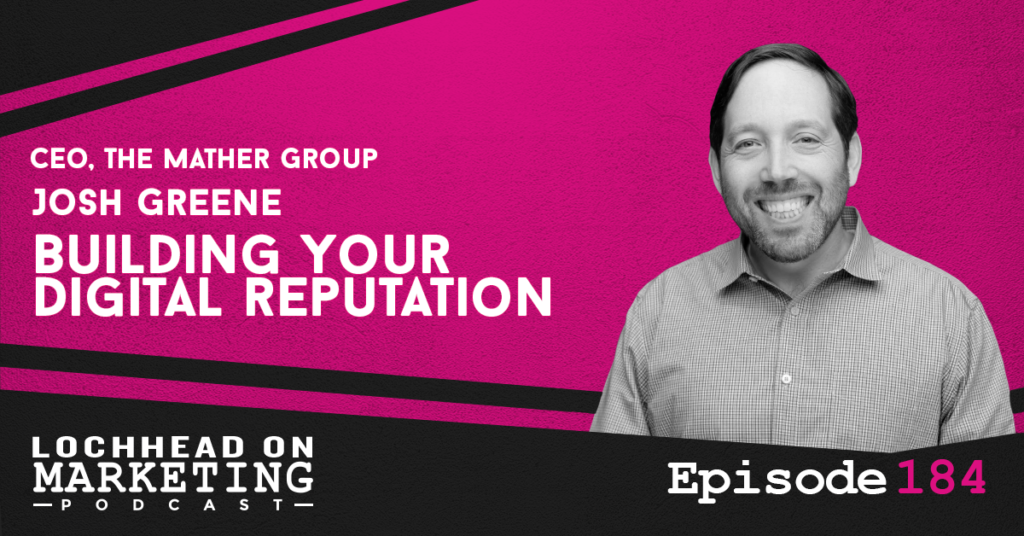
Podcast (lochheadonmarketing): Play in new window | Download (Duration: 1:09:33 — 47.8MB) | Embed
Subscribe: Apple Podcasts | Spotify | RSS | More
On this episode, we have a powerful dialogue with our guest, Josh Greene about what it really takes to build your reputation online and do legendary marketing in the digital world.
Josh Greene is the CEO of The Mather Group. In a world of digital marketing BS, sophomores hacks and self-congratulatory vanity metrics, Josh is the real deal.
Welcome to Lochhead on Marketing. The number one charting marketing podcast for marketers, category designers, and entrepreneurs with a different mind.
Josh Greene on Marketing and Reputation Management
The episode starts off with a discussion about marketing trends and reputation management with Josh Greene. They touch upon the impact of AI on marketing strategies and delve into reputation management techniques. Christopher highlights how individuals with negative reputations try to bury their past misdeeds in online search results. Josh explains that reputation management involves manipulating search engine rankings to push down negative content and make it less visible, while at the same time providing more positive information about you or your company.
They also touch on the evolving landscape of SEO (Search Engine Optimization), with Josh emphasizing that SEO is not dead but constantly changing. He notes that traditional SEO tactics, such as keyword optimization, have evolved due to changes in Google’s algorithms and the increasing importance of AI-driven queries.
Josh Greene on what is the Internet thinking about you
They also discuss the topic of the evolving landscape of SEO and the impact of AI, particularly in large language models like ChatGPT and Bard. As mentioned earlier, Josh highlights how SEO has evolved beyond optimizing for Google to also include considerations for AI-driven queries. He then emphasizes the importance of managing one’s online reputation in this context.
On the topic of AI, Christopher shares his experience with ChatGPT, mentioning how it produced relevant results related to category design, which led him to ponder the connection between AI training data, the internet’s content, and these AI models’ abilities to provide meaningful information. He also mentions that experts in various fields, including category design, are actively teaching AI models to enhance their understanding and capabilities.
Josh Green on how to stand out from the crowd
They then discuss how to stand out in the digital landscape, particularly in the context of AI and SEO. Josh explains that AI models like those used by Google rely on credible sources, with Wikipedia and Google’s patent tool being primary sources. He emphasizes that credibility, links, and signals play a significant role in determining the relevance of content for AI models. Much like in SEO, authoritative content with strong signals will have a more substantial impact.
Christopher adds that AI is evolving similarly to SEO and mentions that some individuals are already trying to exploit AI for personal gain by selling courses on how to manipulate AI models. He highlights the importance of providing valuable content to help people rather than merely trying to stay ahead of trends or exploit emerging technologies.
They both agree that the key to success in the digital age, whether in AI or SEO, is delivering valuable content and expertise to genuinely assist others rather than chasing quick fixes or trends promoted by self-proclaimed gurus. They also note that having a real impact requires substance and credibility, not just buzzwords.
To hear more from Josh Greene and on how you can build your online reputation, download and listen to this episode.
Bio
Links
Connect with Josh Greene!
We hope you enjoyed this episode of Lochhead on Marketing™! Christopher loves hearing from his listeners. Feel free to email him, connect on Facebook, Twitter, Instagram, and subscribe on iTunes!

